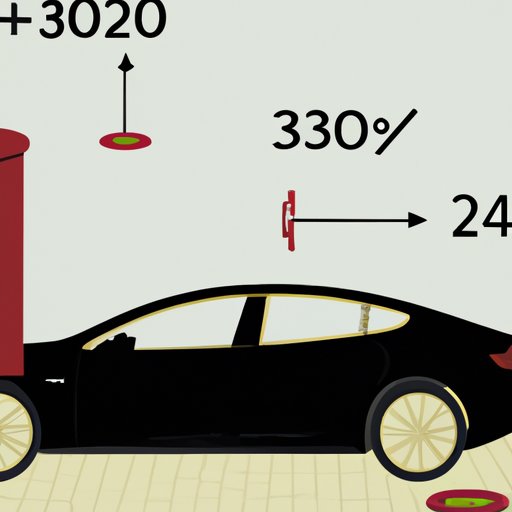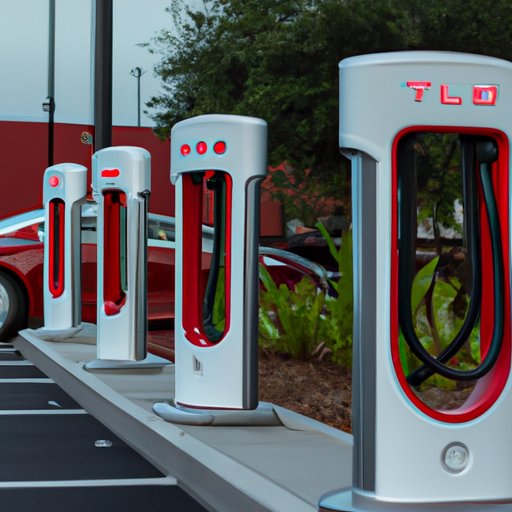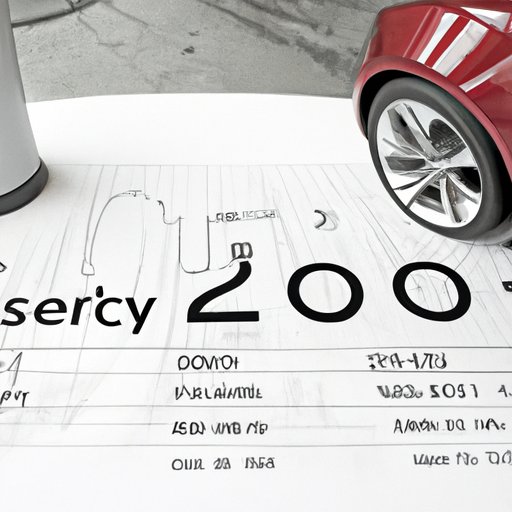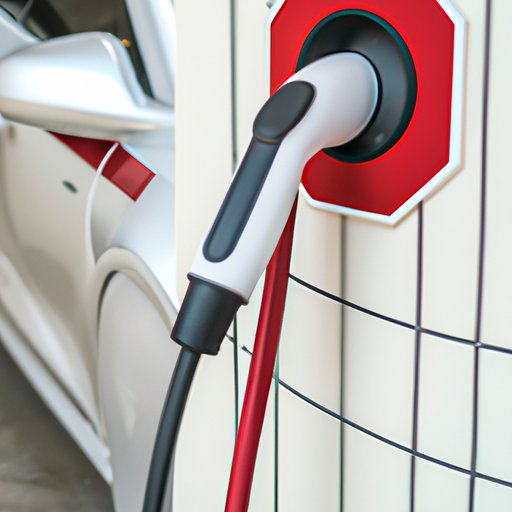Introduction
Tesla is an American electric vehicle manufacturer that designs, manufactures, and sells luxury electric cars and electric vehicle powertrain components. Tesla’s mission is to accelerate the world’s transition to sustainable energy and provide a zero-emission mode of transportation. Tesla offers several models of electric vehicles, including the Model S, Model X, and Model 3, as well as its energy storage products, such as Powerwall and Powerpack.
This article is a comprehensive guide to the cost of charging a Tesla. We will explore the factors that influence the cost of charging a Tesla, the different types of charging stations available for Tesla, an in-depth look at how much it costs to charge a Tesla, and tips for cutting down on Tesla charging costs.
Comprehensive Guide to the Cost of Charging a Tesla
The cost of charging a Tesla varies depending on the type of charging station used, the amount of electricity consumed, and other factors. There are three main types of charging stations available for Tesla: home charging, public charging, and workplace charging.

Factors That Influence the Cost of Charging a Tesla
There are several factors that can influence the cost of charging a Tesla. These include the type of charging station used, the amount of electricity consumed, the rate at which the electricity is delivered, and the cost of electricity in the area where the charger is located. Additionally, some states offer incentives for electric vehicle owners, such as tax credits or lower electricity rates, which can reduce the overall cost of charging a Tesla.

Types of Charging Stations Available for Tesla
Home charging stations are the most common type of charging station for Tesla. Home charging stations are typically Level 2 chargers, which use 240 volts of alternating current (AC) to deliver power to the vehicle. Home chargers typically range from 16 amps to 40 amps, and can charge a Tesla battery in about four to nine hours, depending on the size of the battery and the speed of the charger.
Public charging stations are another option for Tesla owners. These charging stations are typically Level 2 chargers, with higher amperage than home chargers. Public chargers are typically faster than home chargers, and can charge a Tesla battery in as little as two to four hours. However, they can also be more expensive than home chargers, depending on the location.
Workplace charging stations are also available for Tesla owners. These charging stations are typically Level 2 chargers, with higher amperage than home chargers. Workplace chargers are typically faster than home chargers, and can charge a Tesla battery in as little as two to four hours, depending on the size of the battery and the speed of the charger.
An In-Depth Look at How Much It Costs to Charge a Tesla
The cost of charging a Tesla depends on the type of charging station used, the amount of electricity consumed, and the cost of electricity in the area where the charger is located. Home charging costs typically range from 8¢ to 18¢ per kWh, while public charging costs can range from 12¢ to 30¢ per kWh. Workplace charging costs vary, depending on the employer’s electricity rate.
According to a study by the University of California, Davis, the average cost of charging a Tesla at home is 11.5¢ per kWh. This cost includes both the cost of the electricity and the cost of the charger. The average cost of charging a Tesla at a public charging station is 22.3¢ per kWh. This cost includes the cost of the electricity and the cost of the charger.

Breaking Down the Cost of Fully Charging a Tesla
The cost of fully charging a Tesla depends on the size of the battery and the type of charging station used. Most Tesla batteries have a capacity of 75 kWh, but this number can vary depending on the model. The average cost per kWh for charging a Tesla is 11.5¢ for home charging and 22.3¢ for public charging.
Using these figures, we can calculate the total cost of fully charging a Tesla. For a 75 kWh battery, the total cost of fully charging a Tesla at home would be approximately $8.62 (75 kWh x 11.5¢/kWh). The total cost of fully charging a Tesla at a public charging station would be approximately $16.72 (75 kWh x 22.3¢/kWh).
Comparing Home, Public, and Workplace Charging Prices for Tesla
When considering the cost of charging a Tesla, it is important to compare the prices of home, public, and workplace charging. Home charging prices typically range from 8¢ to 18¢ per kWh, while public charging prices can range from 12¢ to 30¢ per kWh. Workplace charging prices vary, depending on the employer’s electricity rate.
For example, if the employer has an electricity rate of 10¢ per kWh, then the cost of charging a Tesla at the workplace would be approximately $7.50 (75 kWh x 10¢/kWh). This is much lower than the cost of charging at a public charging station, which would be approximately $16.72 (75 kWh x 22.3¢/kWh).
Understanding the Cost of Charging a Tesla: What You Need to Know
Charging a Tesla can be expensive, but there are several benefits that come with using Tesla charging stations. Tesla charging stations are designed to be safe and reliable, and they offer features such as automatic shutoff and overcurrent protection. Additionally, Tesla charging stations are compatible with all Tesla models, making it easy to charge any Tesla vehicle.
In order to reduce the cost of charging a Tesla, it is important to consider the various factors that can affect the cost. Home charging is typically the most cost-effective option, as it is usually cheaper than public charging. Additionally, some states offer incentives for electric vehicle owners, such as tax credits or lower electricity rates, which can help reduce the overall cost of charging a Tesla.
Conclusion
In conclusion, charging a Tesla can be expensive, but there are several factors that can influence the cost. Home charging is typically the most cost-effective option, as it is usually cheaper than public charging. Additionally, some states offer incentives for electric vehicle owners, such as tax credits or lower electricity rates, which can help reduce the overall cost of charging a Tesla.
By understanding the factors that influence the cost of charging a Tesla, and by taking advantage of incentives offered by some states, Tesla owners can save money on their electric vehicle charging costs.
(Note: Is this article not meeting your expectations? Do you have knowledge or insights to share? Unlock new opportunities and expand your reach by joining our authors team. Click Registration to join us and share your expertise with our readers.)
